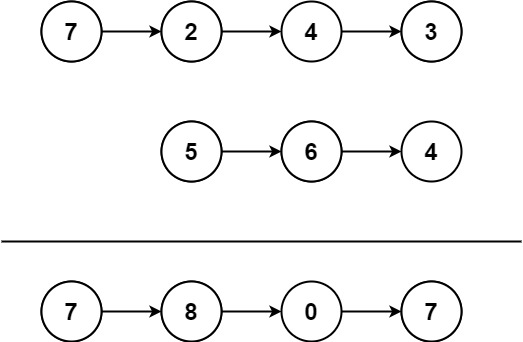Q:
You are given two non-empty linked lists representing two non-negative integers. The most significant digit comes first and each of their nodes contains a single digit. Add the two numbers and return the sum as a linked list.
You may assume the two numbers do not contain any leading zero, except the number 0 itself.
Example 1:

Input: l1 = [7,2,4,3], l2 = [5,6,4] Output: [7,8,0,7]
Example 2:
Input: l1 = [2,4,3], l2 = [5,6,4] Output: [8,0,7]
Example 3:
Input: l1 = [0], l2 = [0] Output: [0]
Constraints:
- The number of nodes in each linked list is in the range
[1, 100]. 0 <= Node.val <= 9- It is guaranteed that the list represents a number that does not have leading zeros.
Follow up: Could you solve it without reversing the input lists?
A:
用vector保存,方便取最后一位/**
* Definition for singly-linked list.
* struct ListNode {
* int val;
* ListNode *next;
* ListNode() : val(0), next(nullptr) {}
* ListNode(int x) : val(x), next(nullptr) {}
* ListNode(int x, ListNode *next) : val(x), next(next) {}
* };
*/
class Solution {
public:
ListNode* addTwoNumbers(ListNode* l1, ListNode* l2) {
vector<int> V1, V2;
while (l1) {
V1.push_back(l1->val);
l1 = l1->next;
}
while (l2) {
V2.push_back(l2->val);
l2 = l2->next;
}
ListNode header;
int carry = 0;
while (!(V1.empty() && V2.empty()) || carry) {
int a = 0, b = 0;
if (!V1.empty()) {
a = V1.back();
V1.pop_back();
}
if (!V2.empty()) {
b = V2.back();
V2.pop_back();
}
int sum = a + b + carry;
ListNode* tmp = new ListNode(sum % 10, header.next);
header.next = tmp;
carry = sum / 10;
}
return header.next;
}
};
Errors:
1: ListNode* tmp = new ListNode(sum % 10, header.next);
2: need also check carry != 0
No comments:
Post a Comment